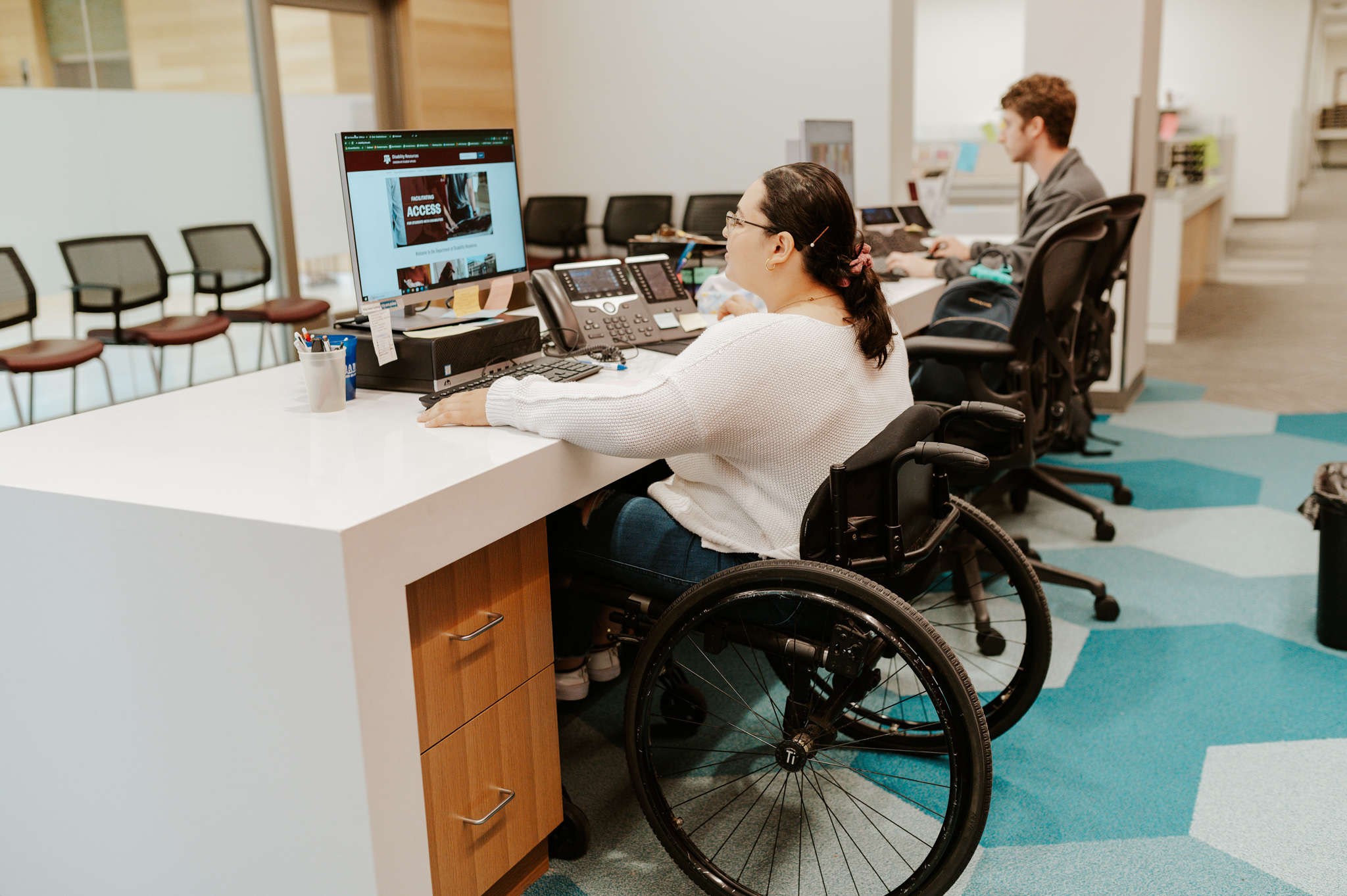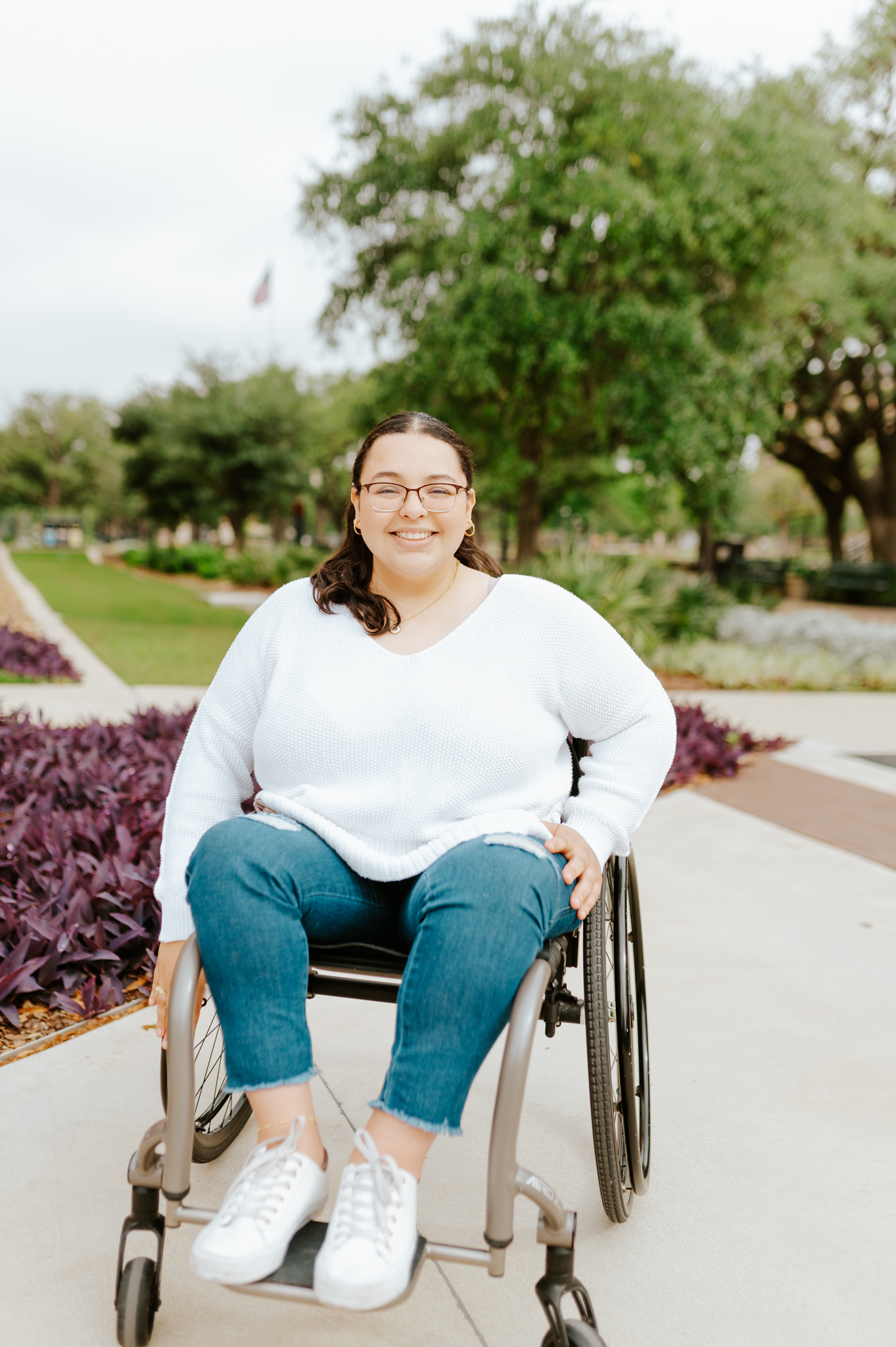MY AGGIE STORY
Brianna Bazan ‘22

By Dorian Martin ’06
Brianna Bazan ’22 can claim many achievements during her time at Texas A&M University. Along with earning a bachelor’s degree in biomedical sciences, she developed a healthy sense of self-advocacy—and strong biceps from traversing the large campus in a manual wheelchair.
She also has exceled in building community, which made her an exceptional student employee for Disability Resources, which is part of the Division of Student Affairs. “She’s a wonderful human, above all else,” said Justin Romack, assistive technology coordinator. “One unique thing about Brianna is that she has found ways to bridge community with her colleagues, including graduate students and international students who work in our testing center. She has become like this dot connector for all of the student employees in our office.”
Graduating from Texas A&M in May, she’s planning to take the knowledge and experiences she’s gained to physician assistant school. Her goal—to serve as a role model and help others with disabilities to live independent lives.
Finding Her Place
The native of Rio Grande City, Texas, Bazan was just 3 years old when she was in a car accident that resulted in a spinal cord injury that paralyzed her. In the aftermath, Bazan’s community looked for every opportunity to support her. “Everybody knew me, so they had everything ready for me and prepared. It wasn’t a question of whether I was going to be able to fit into this classroom or be able to go on this field trip because of the buses,” she said.
Yet being a paraplegic also left her confused about her life purpose. “I was hesitant to choose a career path because I was unsure about what I could do,” Bazan said. “I didn’t really see any type of representation of people who use wheelchairs or those who have disabilities.”
Her aha moment came during an annual checkup at Shriner’s Hospital in Chicago. “That’s where I saw healthcare professionals with disabilities for the first time,” said Bazan. “My physical therapist had prosthetic limbs and a nurse was in a wheelchair. They told me about some doctors on their team who were also in wheelchairs. I got really interested in pursuing a career in the medical field.”

Moving Forward
With a career path finally emerging, Bazan decided to venture beyond her hometown, which has a population of 15,000, to pursue a college education. “I was really nervous about coming to a bigger city because I didn’t know what it was going to be like as far as adaptability,” she said, adding that she also considered the University of Texas at Austin and the University of Texas at San Antonio. “Texas A&M proved to be the most adaptable and accessible school.”
Still, the transition to Texas A&M’s large campus proved to be a physical challenge. “Everything back home is pretty flat—and it’s a small city so I don’t have to use my arms that much,” she said. “But I remember my freshman year in Aggieland, I was so tired. I lost weight because I was exercising more. I was like, ‘Whoa, this isn’t what I’m used to!’”
In addition to the physical challenge, Bazan had to find her own voice. “I had never lived or slept or stayed anywhere else before moving to college, so I had to learn how to be my own advocate,” she said. “Coming to a big campus where nobody knows you, you have to start from the beginning. I had to learn how to reach out to different people when it came to accessibility issues in different classrooms. I’ve had to ask about things like building access, accessible entrances, accessible seating, and making sure that there’s an accessible table in place for me. Sometimes people don’t even realize it’s an issue until somebody brings it up.”
Pushing the Limits
Texas A&M has challenged her in other ways. “Educationally, A&M has definitely pushed me to be more curious,” Bazan said. “Even just hearing the students ask questions in class; these are just some big-brained people! I’m surrounded by individuals who are fully invested in what they are learning, and it’s exciting to be around other students who care about what they’re studying.”
She’s also participated in Texas A&M’s Aggie Adaptive Sports organization, which brings Aggies and community members with disabilities together to socialize and participate in sports. “I was curious and had never done this,” she said. “Through this organization, I’ve also met several people with a disability. It’s really fun to relate to them and know that when we have accessibility issues, we can brainstorm together about how to solve them.”
Bazan has been active in Texas A&M’s Biomedical Science Association, participating in community projects such as Aggie Replant, a canned food drive and Halloween at the Bryan Children’s Museum. She’s also volunteered at CHI St. Joseph Health System, where she’s had the opportunity to interface with individuals in assisted living, the nursery, and the pediatrics department.
A Helping Hand
One of Bazan’s proudest achievements has been her work with Texas A&M’s Disability Resources team. Hired as a student employee, she initially assisted with receptionist and office tasks before being invited to join the assistive technology team. “I’ve helped transcribe reading materials for students who need accessible texts,” she said, adding that one of her most prized work experiences was assisting with translating a textbook into Braille. “I was able to see all of these resources that students with other disabilities have access to.”
These experiences have broadened Bazan’s understanding of accessibility. “It’s definitely opened up my eyes to many different types of disability issues. I’ve always just focused on physical accessibility issues,” she said. “When it comes to school and academic accessibility issues, I had never thought about something like a textbook not being accessible or that PowerPoint slides may need captions.”
Planning on a career in either pediatrics or physical medicine and rehabilitation, Bazan is committed to being an advocate for individuals with disabilities. “I’ve always wanted people in healthcare to understand how important it is to have open arms and open eyes when interacting with patients who have disabilities,” she said. “Healthcare staff need to learn more about different disabilities and realize that sometimes patients may not be able to advocate for themselves. Ultimately, they just to have patience with patients and help them gain the confidence to navigate life.”

